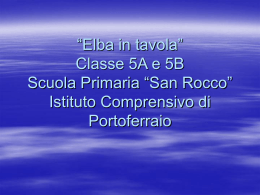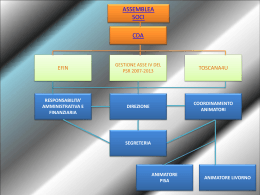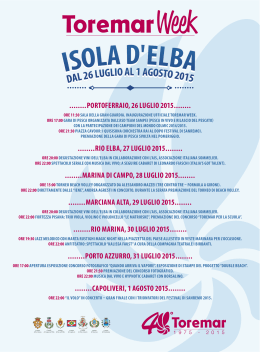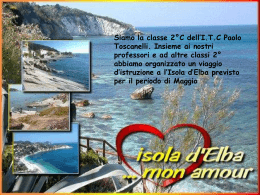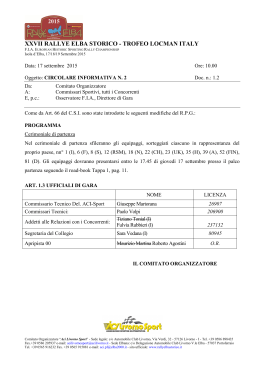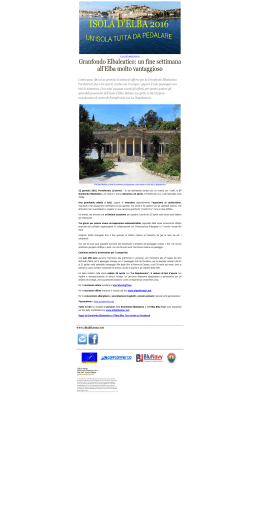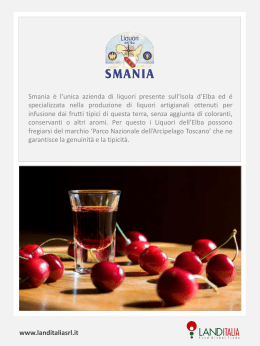di/by Lucia Soppelsa RITORNO ALLE ORIGINI QUANDO IL SAPORE AUTENTICO ©Foto: Elba Nostrale DELLA CULTURA LOCALE DIVENTA RISORSA DI OGGI Il Convio nei primi del ‘900 (Spiaggia di Cavoli) Il Laghetto Conche Campo delle nell’Elba made in elba già pronto da gustare, come la sburrita, fatta col baccalà. E questi piatti di “casa nostra” diventano delizie da assaporare anche oltre oceano. Ma c’è molto, molto di più. Piccoli produttori provano a “catturare” nel vetro il sapore della frutta locale. Nascono le marmellate dai sapori inconfondibili di corbezzolo, more, fichi, mandorle e noci, ma anche di limoni, cachi, susine, albicocche, profumati di nepitella, rosmarino, uvetta, talvolta misti a carota, zucca e cipolla… Si riscopre il gusto delle conserve da abbinare a formaggi, carni, verdure… si mescolano sapori, usanze, aromi. Nascono i liquori dell’Elba. Non più prelibatezza per pochi, realizzata nella vecchia cantina di famiglia, ma bontà che tutti possono gustare. Si produce anche la birra dell’Elba, frutto di una sapiente lavorazione artigianale. Compare anche la prima “caramella” made in Elba con otto gusti, ciascuno per ogni comune dell’isola e con l’aroma intenso delle essenze del mediterraneo. Si ritorna a lavorare la terra. Giovani e sempre più spesso donne laureate, de- cidono di investire energie e risorse nell’agricoltura e nell’agriturismo. È un’Elba nuova che guarda al futuro senza dimenticare il passato. Si applicano metodi produttivi moderni nel rispetto dell’ambiente. Si offrono pacchetti soggiorno che siano anche insegnamento alla cultura locale e alla riscoperta della terra. La vacanza si trasforma e diventa esperienza didattica: turismo e cultura. Ed anche la cultura degli elbani è cambiata. Tutto dopo un secolo si è trasformato, tutto dopo 100 anni è ancora più fortemente elbano di quanto non fosse nel passato. Ora più che mai c’è la consapevolezza che “le radici” sono il futuro e gli elbani guardano con fiducia a quel futuro non dimenticando chi sono, da dove vengono e ancora di più, dove vogliono andare. BACK TO THE ROOTS WHEN THE AUTHENTIC FLAVOR OF LOCAL CULTURE BECOMES TODAY’S WEALTH E lba 1900. A stretch of cultivated land. Soft rolling hills embroidered with rows of vines climbing one after another in a perfect maze of unequalled precision. Green and luxurious olive groves rise in endless continuity up to the horizon. Labored land, rich land, exploited land. Never infertile. Bright colors lend many a reflection to the panorama. Red, shimmering land. To the east, iron ‘bubbles’ from the depths of the earth up to the surface. You work in the mine. It is a tough job that pays little and makes you sweat a lot, but it offers security. For many, mining means hope, progress, the future. To the west, the certainty is granite. The quarries in San Piero, Cavoli, and Seccheto where master artisans carve out a talented craftsmanship. Granite slabs are loaded onto ships and take their route for far afield. Another source of sustenance. From time immemorial. Thousands of barrels of wine and oil leave their motherland heading for Genoa or Civitavecchia. Blast furnaces, the symbol of industrialized Elba, 110 made in elba stand out in Portoferraio. An island rich in strengths, resources, ingeniousness, talented labor. Locals are aware of this, but not down to the marrow. Then it’s the onset of the war. Generous lands like this still mean safety and security for everyone. A big help is offered by the sea, too. A sea that is also a scenario to the war, to sunken ships, sieges and death, but it is also source of life. A great basin from which one can draw endlessly. It’s the 50’s, post-war period. Hope can be seen in the eyes of the people. Some decide to leave. The sea still represents an opportunity. Large transatlantic, ‘long voyage’ cruises, a new era. Others arrive, instead, on the Island, trying to reinvent it. It is the birth of the fishing industry and, above all, tourism.Elba becomes the leisure destination of fortunate Italians and Europeans in general. It’s an emblem of economic recovery for the country. Agriculture is not abandoned, but transformed. Fewer and fewer farmers in the traditional sense, and more entrepreneurs of the land. The first agricultural estates begin to blossom. Wine becomes a refined product, endowed with its appellation of origin, testifying to a high quality product, the symbol of “Made in Elba”. The landscape changes. The arid hills bearing the signs of hard labor are replaced by Mediterranean chaparral, villas and leisure resorts. The bountiful beauty of the Island beaches is thus unveiled, along with its coastlines and its deep blue sea; a destination for a relaxing vacation. Elba continues to produce, tireless and unstoppable. After the economic boom, though, the Island sees a slow and gradual return to its origins. Elba and its producers discover the intrinsic value of local eno-gastronomy. The era of the ‘Slow’ culture makes its first steps. The prestigious village of Procchio experiences the opening of the first “Earth and Sea Market”, where the only products sold are products that come from the Island. Organic vegetables and fruit, the catch of the day from the surrounding sea, traditional cakes made following authentic recipes, delicious honey accompanying cheeses produced with local sheep’s milk. Yes, it’s true, in the 21st century Elba has rediscovered sheep breeding: not just old families of shepherds, but also young graduates from agronomy schools who have decided to follow this ancient craft with passion and devotion fine-tuning their knowledge to reinvent a job in close contact with nature. Then, there is “Elba in a Jar”. Fresh products packed in glass jars that you can taste once back home after a vacation to this marvelous seaside destination. Food is always the expression of local culture, a synonym of the genuineness obtained from local raw materials that are processed in artisan workshops of the Island. Stockfish with olives, pine nuts and tomatoes, or salt cod based dishes. Everything can be put in a glass jar that you can take home, even overseas. There’s much more, though. Small scale producers ‘capture’ the flavor of local fruit in a glass jar for exquisite jams made of Strawberry Tree berries, blackberries, figs, almonds and walnuts, lemons, persimmons, plums, apricots, flavored with calamint, rosemary, raisins, sometimes mixed with carrots, squash and onions… Jams that are used to accompany cheese, or meat and vegetables… A melting pot of flavors where ancient aromas and customs play a leading role. Traditional spirits and liqueurs are born on Elba, once destined for a limited few, and that now everyone can enjoy. Elba also produces beer - the ultimate experience of superb craftsmanship. Elba has recently introduced its own typical candy, produced in eight flavors (one for each town on the Island), where the intense aroma of Mediterranean herbs prevail. The return to laboring the land. Young men and young women with degrees decide to invest energy and resources in agriculture and farm-holiday resorts. A new Elba looks at the future without ever neglecting its past. State-of-the-art production technology safeguards the environment. Vacation packages include offers that encompass the discovery of the local culture, the land and full contact with nature. The vacation is transformed and becomes a didactic experience. Even the culture of the locals has changed. After one hundred years, everything has changed, yet everything is strongly tied to the Island’s roots, now more than ever. Aware that the future lies in their own roots, the people of Elba look enthusiastically toward the future without forgetting who they are, where they come from and, most of all, where they are going. 112 Terre del Granito Ci sono tesori che ancora l’Elba ci regala! La terra... è da lei che inizia la magia, il sole, il mare e la mano sapiente dei gesti antichi, unici e sempre eterni come la soddisfazione di bere una rarità. © Foto Paolo Ridi The Island of Elba has yet another treasure for us! It’s land... and thanks to it’s unique and everlasting sun and sea, the magic of the skilled craftsmen still today grants us the joy of drinking something absolutely unique. Campo nell’Elba Loc. Vallebuia, 1492 Tel. +39 0565 987035 [email protected] ISOLA D’ELBA www.agricoopelba.it Agricoop Elba Terre del Granito Lacona - Capoliveri Viale dei Golfi Tel. +39 338 4036273 [email protected] aziende agricole/wine cellars ARRIGHI TENUTA LA CHIUSA O riginariamente chiamata “La Casa”, La Chiusa di Magazzini è una delle realtà vitivinicole più antiche dell’Elba. È intorno al 1850 che prende il nome dal possente muro di cinta, finito di costruire dalla famiglia Senno per proteggere i vigneti e gli olivi che si estendono fino al mare. Nel 1866 La Chiusa viene venduta alla famiglia Foresi che ne tiene le redini per un secolo e mezzo, trascorso a lavorare in vigna ed in cantina con un impegno tale da contribuire ad innalzamento del vino “Made in Elba”. Dal 2003 è di proprietà della famiglia Corradi che, nel rispetto di quattro secoli di storia e di duro lavoro, ha saputo interpretare il senso della tradizione rurale elbana. L ’Azienda Agricola Arrighi coltiva vite e produce vino da generazioni. Estesa per 9 ettari ha come obiettivo quello di produrre vini di qualità da uve dei propri vigneti e di sperimentare nuovi vitigni adatti al terroir isolano. Sono nate così due linee di produzione: una quella dei vitigni tradizionali elbani con procanico, ansonica, riminese e biancone per le uve bianche, e con aleatico, sangiovese e tintiglia per quelle a bacca rossa; l’altra quella della linea sperimentale con chardonnay, viogner e manzoni bianco e i rossi syrah e sagrantino. Qui è possibile fare degustazioni e “enochiacchere”. T nown originally as ‘La Casa’, La Chiusa in Magazzini is one of the oldest wine producers on the Island of Elba. This splendid estate took its present name around the mid-19th century, drawing inspiration from the imposing wall built by the Senno family. In 1866, the Foresi family purchased La Chiusa, and owned and managed it for over one hundred and fifty years, plowing the land and working in the cellar to bring their wine production to the highest levels in terms of quality and prestige. Since 2003, the Corradi family has owned La Chiusa and, bowing to four centuries of history and hard work, has interpreted the rural wine producing traditions of Elba. he Arrighi Farming enterprise has been devoted to vineyard cultivation and wine production for generations. The estate stretches over nine hectares of land; The goal of the enterprise is to produce wine from its own grapes and to experiment with new grapes adaptable to the island terroir. This philosophy led to develop two lines of production: one based on traditional Elba grapes for both white wines (Procanico Ansonica Riminese and Biancone) and red wines (Aleatico, Sangiovese and Tintiglia); while the second is an experimental line based on Chardonnay, Viogner and Manzoni Bianco for white wines and on Syrah and Sagrantino for red wines. At the estate, it is possible to enjoy wine and oil tasting sessions. Azienda Agricola La Chiusa Località Magazzini - Portoferraio Tel. + 39 0565 933046 www.tenutalachiusa.it Azienda Agricola Arrighi Loc. Pian del Monte - Porto Azzurro Cell. +39 335 6641793 RRIGHI I S O L A D ’ E L B A www.arrighivigneolivi.it K Tenuta La Chiusa 114 A VIGNE & OLIVI aziende agricole/wine cellars TERRE DEL GRANITO L ’azienda agricola e agrituristica Terre del Granito, situata nelle colline di Vallebuia a monte della baia di Seccheto, è immersa nella macchia mediterranea del Parco Nazionale dell’Arcipelago Toscano. Prende il nome dalla roccia granitica che fa da sfondo al paesaggio. La principale produzione è vitivinicola, accompagnata da quella tradizionale di pregiato miele e più recentemente di olio extravergine di oliva. La superficie aziendale di proprietà è di 5 ettari, cui si aggiungono altri 6 ettari di vigneto di altre proprietà, che conferiscono le uve alla cantina delle Terre del Granito. T he Terre del Granito farming enterprise and vacation resort, on the hills of Vallebuia, is immersed in the Mediterranean chaparral that distinguishes the National Park of the Tuscan Archipelago. Its name is drawn from the granit rock that paints the entire landscape. The leading winemaking activity is accompanied by traditional honey production and, more recently, extra virgin olive oil. The estate stretches over a five-hectare surface, plus six hectares of land cultivated with vineyards, which yield grapes for the farm’s wine. Az. Agricola Agricoop - Terre del Granito Loc. Vallebuia, 1492 - Campo nell’Elba Tel. +39 0565 987035 www.agricoopelba.it 115
Scarica

